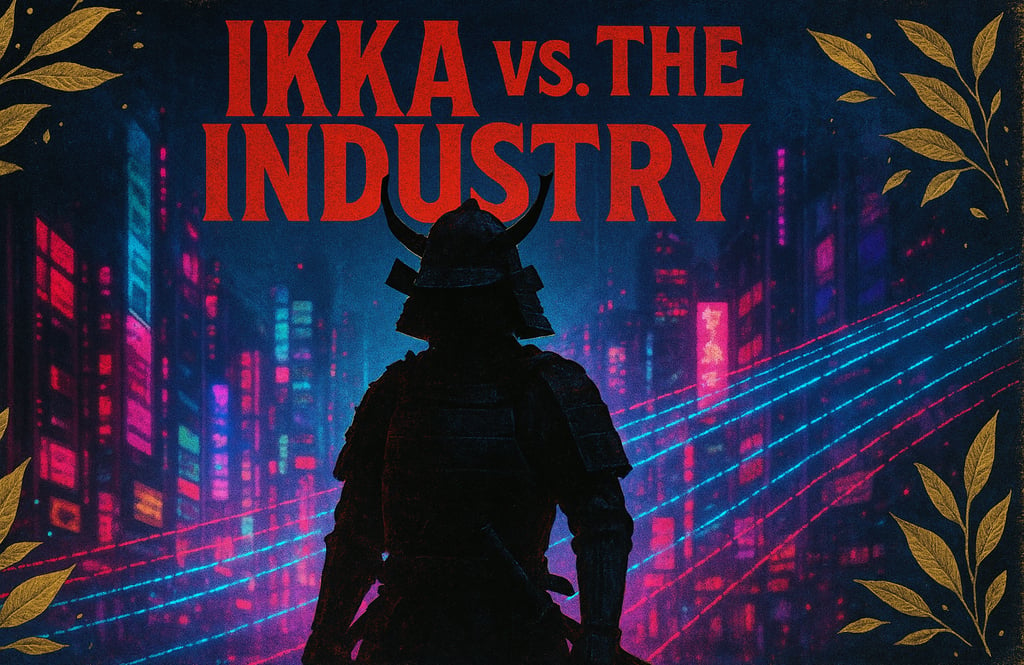Ikka vs. The Industry: Reading the Tea Leaves in FUBU’s Subliminal Disses and Cultural Commentary
Abhay
8/13/20253 min read


Ikka’s latest EP, FUBU, is more than a collection of five hard-hitting tracks—it’s a strategic salvo aimed squarely at the machinations of the Indian music industry. Through razor-sharp wordplay, pointed metaphors, and subversive cultural commentary, Ikka positions himself as both participant and critic of the system that helped build him.
Reframing “FUBU”: From Brand to Battle Cry
Originally an acronym for “For Us, By Us,” FUBU was a declaration of Black entrepreneurship and community empowerment. Ikka subverts this legacy, repurposing it as “Fuck You, By Us”—a daring manifesto of artistic autonomy and defiance against industry gatekeepers. By invoking a globally recognized brand, he conspicuously bridges American streetwear’s outsider ethos with the burgeoning Indian hip-hop movement, asserting that true cultural value can only emerge “by us,” outside of corporate influence.
Subliminal Shots and Open Salvos
“Dogs & Snakes”: Warning the Pack
The opener, “Dogs & Snakes,” uses animal allegory to depict a duplicitous ecosystem rife with “collabs” motivated by convenience rather than conviction. Ikka describes opportunists as “barking loyalty while slithering venom,” a direct allusion to inauthentic alliances crafted purely for playlist placements. The track’s sharp switch-up midway—dropping trap hi-hats into grimy bass—sonically mirrors the sudden sting of betrayal.
“FUBU”: Naming Names Without Naming Names
On the title track, Ikka juxtaposes references to “Midas hands”—supposed hitmakers—with “mid-ass plans” peddled by executives chasing viral moments. Lines such as “they market my chaos like a brand campaign” indict label strategies that package conflict into clickbait, reducing rich narratives to social-media soundbites. By refusing to drop specific names, Ikka ensures his critique resonates broadly across industry factions, from A&R to streaming platforms.
“Art Samajh Aata Nahi”: A Lament for Lost Integrity
“Art Samajh Aata Nahi” stands as the EP’s moral fulcrum. Over a subdued piano loop and brittle percussion, Ikka laments the “data-driven gospel” that worships daily stream thresholds and monthly listeners. He questions, “When did we sign off our souls for subscriber counts?”—a rhetorical strike at executives whose dashboards often eclipse artist development meetings. The track climaxes with a choir of distant voices chanting “samajh aata nahi,” underscoring the industry’s deafness to creative depth.
“Ambulance”: Resuscitating Authenticity
In “Ambulance,” Ikka employs medical imagery—“revive these lifeless bars,” “CPR on a broken beat”—to dramatize his mission to rejuvenate Indian hip-hop’s core values. Producer Sez on the Beat layers staccato strings with siren-like synths, evoking emergency rooms and frontline crises. This sonic urgency mirrors Ikka’s rallying cry: only by prioritizing craft over commerce can artists “save the culture from a flatline”.
“Sunta Hoon Rawal”: Tribute or Tactical Move?
Closing the EP, “Sunta Hoon Rawal” seemingly offers tribute to Delhi underground stalwart Rawal. However, Ikka’s choice to spotlight Rawal’s independent grind is a calculated contrast to major-label pathways. He raps, “I hear Rawal’s echo beyond neon towers,” suggesting genuine resonance arises in grassroots spaces, not boardrooms. This final track doubles as both homage and manifesto, reaffirming that authenticity thrives outside commercial pipelines.
Beyond the Bars: Cultural and Industry-Level Commentary
Ikka’s EP transcends braggadocio, weaving broader critiques of an ecosystem where:
Streaming supremacy marginalizes regional dialects and vernacular flows, privileging homogenized delivery suited for global playlists.
Algorithmic gatekeeping replaces traditional A&R scouting, favoring data analysts over culture-curators.
One-size-fits-all marketing erases local subcultures—Punjabi ghettos, Mumbai streets, Kolkata underground—undermining hip-hop’s regional diversity.
By embedding these themes in accessible metaphors, Ikka invites listeners to question: whom does the industry truly serve?
Strategic Independence Under a Major Label
An intriguing paradox: Ikka delivers these barbs while signed to one of India’s leading labels. This duality underscores a shifting power dynamic—artists demanding both global reach and creative sovereignty. Ikka’s ability to critique corporate mechanics on his own label’s dime signals a broader trend of negotiated autonomy, where savvy artists leverage label resources without surrendering narrative control.
Visual Reinforcement: Samurai Ethos and Urban Warfare
The EP’s artwork and music videos reinforce its themes. Ikka dons samurai-inspired gear—armor plates, kabuto masks—portraying himself as lone warrior confronting industry armies. Urban backdrops—graffiti alleys, neon-lit rooftops—underscore the collision of tradition and modernity, suggesting that hip-hop’s next frontier is a battleground requiring both honor and grit.
Conclusion: The Tea Leaves Speak Loudly
FUBU is both battle cry and diagnosis. Each track functions as a case study in systemic critique, from pointed disses to philosophical meditations. As the EP reverberates through streaming feeds and social feeds alike, it demands that listeners—and industry stakeholders—recognize the stakes: safeguarding artistic integrity against the commodification currents that threaten to dilute the very essence of hip-hop. In this climate, Ikka emerges not only as a frontline rapper but as a conscientious critic, urging a recalibration of value systems before the culture itself flatlines.

🎶 Get The Bars, The Beats, The Backstories – Direct to Your Inbox.
Send your Articles
Stay updated with the latest hip hop trends.
Stay Connected
rap@grillg.com
+91-9911428513
© 2024. All rights reserved.
